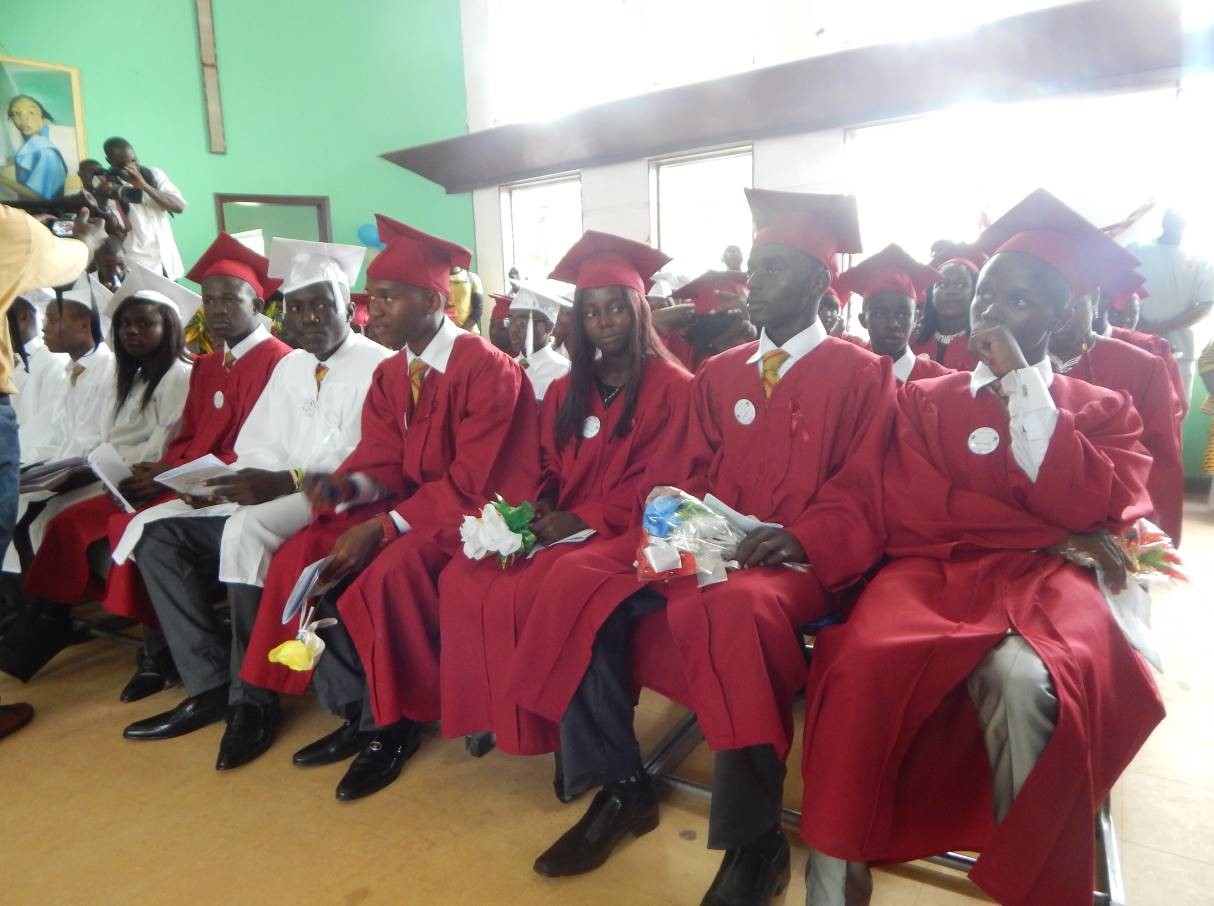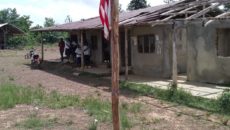MONROVIA, Liberia – Ricks Institute has challenged the Ministry of Education’s reform policy which requested that no schools hold a graduation due to the shortened school year.
On June 25, the Minister of Education, George Werner, detailed his plan to improve the education system after the Ebola crisis by announcing that all schools should be closed by July 31.
Because of the condensed schedule, Werner also announced that there would be no West African Examination Council or West African Secondary School Certificate Exams for school-based candidates. Only private individuals who were retaking could be allowed to sit for the tests.
Accordingly, since a requirement for completion of grades 12 and 9 is passing these tests, students who were enrolled in these grades during the condensed school year would have to repeat the grades and wait until the 2016 exams.
On October 15, the ministry released a press statement that it had been informed of Ricks Institute’s upcoming graduation for the 2014/2015 academic year.
The statement, signed by J. Maxime Bleetahn, the Director of Communication, said the graduation ceremony of Ricks Institute would be in clear violation of the ministry’s reform policy and thus “anti-government.â€
Further, the Education Ministry said it expected that the administration of Ricks Institute would adhere to its reform policy, as failure to do so would lead to severe consequences. Those consequences were not specified.
In apparent defiance of the statement, Olu Menjay, the principal of Ricks Institute, proceeded with the October 18 graduation of 49 students.
Menjay claimed the school’s action was not meant as a challenge to anyone’s authority. He noted that the administration of Ricks Institute respects authorities and operates in the confinement of “simple rules and regulations.â€
“Ricks Institute makes no apology for educating the Liberian children and did what was right for the students,†Menjay added.
“Our gathering here brings to closure our academic year while focusing on the challenges and possibilities of a new school year, which commences on October 26, 2015,†he said.
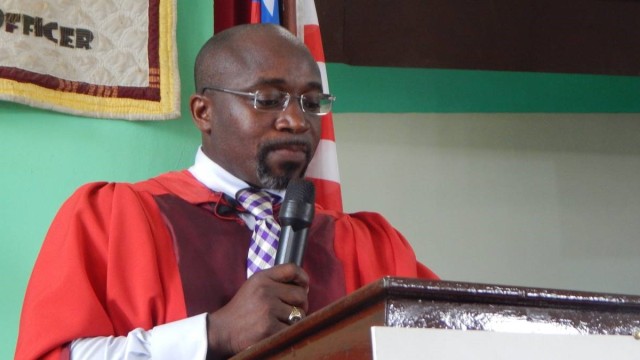
Olu Menjay, Principal of the Ricks Institute, speaks at the ceremony
Menjay said there was no clarity on the closure of schools, and his administration was able to readjust the Institute’s academic schedule to accommodate the vague instructions from the Ministry of Education.
He did not clarify which aspect of the modified academic calendar was unclear. The ministry had specified July 31 as a deadline for closure and afterwards, a return to the regular September to June schedule.
In detailing his explanation of the plan for the new school year, Menjay stressed that his institution would end the academic year on time with other schools that started classes in September 2015.
Menjay further said the institute would not shortchange students. “The institute will be offering more instructional hours to students as compared to what have been required by the Ministry of Education,†he said.
Bernice Dahn, Liberia’s health minister and a member of the presidential cabinet, was in attendance at the graduation.
When quizzed about her presence at the ceremony, Dahn said she was attending as a parent and not a minister.
“I am here to witness the graduation of my grandson,†she added.
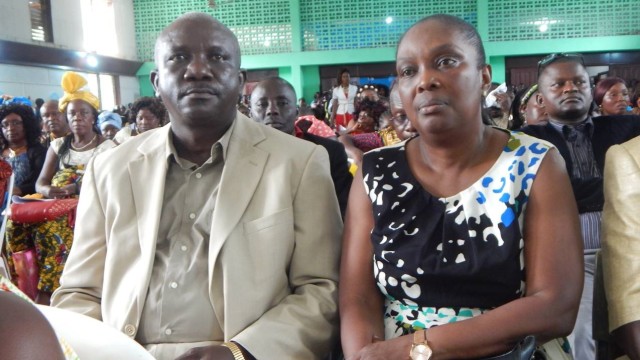
Dr. Bernice Dahn (right), Liberia’s Health Minister, was in attendance at the program. Photo: Zeze Ballah
The presence of Dahn at the graduation has raised questions about whether the presidential cabinet is united in its decisions and whether the government can enforce policies it sets.
A former government official, Freddie Taylor,. said he gathered from the school administration that the ceremony was a thanksgiving service and not a graduation.
“We are in a dynamic society, and as things change, people move along with the changes,†Taylor said.
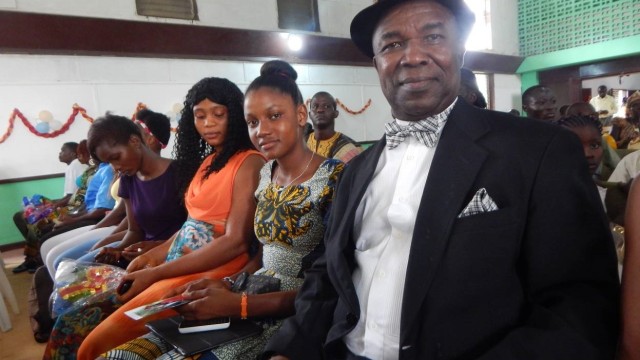
Freddie Taylor at the ceremony. Photo: Zeze Ballah
Taylor explained that he did not see why Ricks Institute should be punished by the government for graduating students that have completed their courses.
“Liberians are confused because the Ministry of Education makes a statement today and says another thing the next time about the education sector in the country,†Taylor said.
Yansue K. Beyan, a graduate, said he was proud to be graduating.
He said whatever the Institute did was aimed at educating future leaders of Liberia. He pointed out that universities in the country were all open, and therefore students in grade 12 should not be sitting at home.
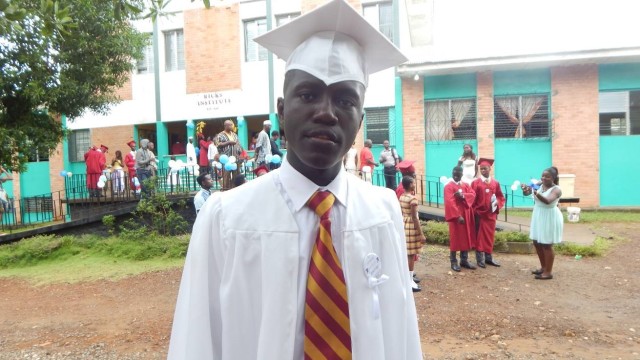
Yansue K. Beyan, a graduate of Ricks Institute. Photo: Zeze Ballah
“Any action taken against the institution after this graduation will not be good for the [Sirleaf] administration,†Yansue added.
He encouraged his colleagues to use whatever knowledge acquired from the Institute to improve their lives.
Following Ricks Institute’s open defiance to the Ministry of Education no graduation policy, the Haywood Mission School has also set its graduation in November.
Leo Simpson, Haywood’s principal, said he supports Ricks Institute’s decision to violate the Ministry of Education’s policy, adding that his institution would also follow suit.
Simpson also confirmed that senior students of Haywood had secretly taken the private candidates’ examinations administered by WAEC last month. He said as soon as his institution receives students’ results from WAEC, graduation would proceed.
He argued that there was no law on the books to stop these senior students from graduating after completing the academic year.
At the time of Ricks Institute’s ceremony, authorities at the Education Ministry were tight-lipped on what the ministry would do since Werner was not in the country.
Upon Werner’s return, there has been no explicit action taken against either school. In an interview with the state broadcaster ELBC, he said the school had backtracked when confronted about the graduation and said they had only held a thanksgiving ceremony.
However, Werner said the ministry had possession of the letters sent to students notifying them of the graduation fees, which explicitly used the word “graduation.â€
Although the Education Minister acknowledged that Ricks Institute violated the ministry’s policy, he did not clarify what, if any, actions would be taken against the school.
Ricks Institute is owned and operated by the Liberia Baptist Education Convention.
Featured photo by Zeze BallahÂ
